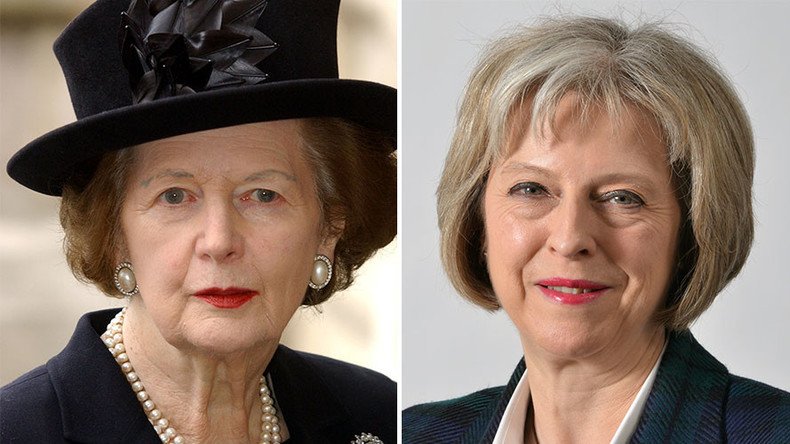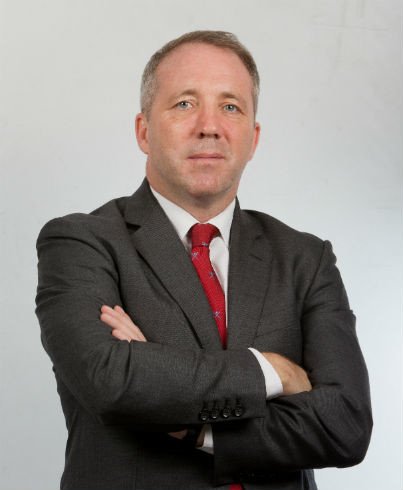Theresa May is no Iron Lady

The leader of the Conservative Party, following Margaret Thatcher, the almost mythical Iron Lady, is Britain’s second female Prime Minister. Any attempt by Mrs. May to follow the Thatcher route will fail.
Theresa May’s statement of intent outside Downing Street last week had a greater ring of truth to it than the infamous quasi-religious declaration by the only other woman to occupy the British Prime Minister’s office.
Margaret Thatcher, whose legacy divides opinion like no other modern politician, was May’s female predecessor. On becoming PM in May 1979, she halted outside Number 10, Downing Street and turned to speak to a TV camera. With towering British policemen flanking her and intimidating protestors baying for blood in the background, Mrs. Thatcher recited the beautiful prayer attributed to St Francis of Assisi. Good Catholic boys like me, who were watching on TV, were not familiar with Thatcher’s version of “an instrument of your peace.”
She said: "Where there is discord, may we bring harmony; where there is error may we bring truth; where there is doubt may we bring faith… " And so on.
Her subsequent actions certainly didn’t bear familiarity to these words. Few political careers have taken a greater detour from the path outlined on the first day.
Thatcher brought such discord and divisiveness that Britain and Europe are still dealing with the shock waves of her 11 years of power. She reveled in division and believed firmly in inequality. And that was why her St Francis moment was so galling and laughable, even at the moment it was delivered, for those in the UK who had observed her career. She had given adequate notice of her intentions, for she had been opposition Conservative leader for four years before becoming PM.
Look at her speech to the Conservative Party conference in Blackpool in 1975. It is a right wing call to arms. She said: “We are all unequal. No one, thank heavens, is like anyone else, however much the Socialists may pretend otherwise.”
When the younger generation struggle to understand why Margaret Thatcher is so despised in the north of England, Ireland, Russia and many other places they should read what she said back then.
The north of England, Scotland and other areas outside London have never recovered from the inequality she brought to her country. London prospered, and is almost a city state now. It is the economic, financial and cultural power of London, that Thatcher re-established, that keeps Britain in the front rank.
I was in London for the Brexit vote and in the Houses of Parliament on the Thursday 23 June. Even before the seismic vote to leave the European Union, Theresa May’s name was being mentioned with quiet respect as a potential leadership candidate.
Now she has received a coronation without a contest, after the other challengers - Boris Johnson, Michael Gove and Andrea Leadsom - fell away. Leadsom’s crass attack on the inability of May and her husband Philip May to have children was political suicide of a particularly tasteless type.
There were no histrionics and saber rattling comparable to Thatcher’s when May took office on Thursday. Yet her anonymous rise has created a problem. As financial markets quake and the European Union looks on, bewildered, we know very little about Mrs. Theresa May. Unlike the Iron Lady, who said she was going to smash the unions, make the rich richer and oppose greater European unification, May remains a mystery. After three weeks of astonishing political upheaval Britain craves some certainty. Though it is a vastly diminished power Britain still plays a significant role internationally. London remains a vital international powerhouse. And, just as in Tony Blair’s day, Britain remains the United States’ closest ally.
We will make Britain a country that works not for a privileged few but for every one of us.https://t.co/4pEvp4Ga9h
— Theresa May (@theresa_may) July 13, 2016
Yet May, the daughter of a Church of England vicar, did seem destined to bring harmony where there was discord. Her speech outside Number 10 was all about unity and with its surprising references to the plight of the poor and racial minorities was most un-Tory-like.
Analysis of the Brexit vote, which can be read in depth here in the Tory supporting Daily Telegraph, shows a country that is riven by division. If you were older, particularly over 60, you were far more likely to vote to leave. If you were better educated you voted to stay. If you were living in an area with high immigration you voted to stay. If you were working class you were far more likely to want to leave.
May had processed all this statistical data and she has moved immediately to confront the division in British society that is Thatcher’s legacy.
She pledged to form a “one nation” government that works for all not just the “privileged few”.
She said: “That means fighting against the burning injustice that if you're born poor you will die on average nine years earlier than others.”
She acknowledged that for an “ordinary working class family life is much harder than many people in Westminster realize.”
In Britain people believe her and like her. There were protests in Whitehall, adjacent to Downing Street, as she spoke. But the bizarre rave type protest was gentler than the frightened and angry hordes that tried to shout down Thatcher.
Mrs. May is emotionally intelligent and understood from the start – she was first elected to the House of Commons in 1997 – that the Tories had an image problem.
She became party chairwoman in 2002 and made a speech that has been referred to many times since she became a contender.
“Our base is too narrow and so, occasionally, are our sympathies,” she said, “You know what some people call us? The nasty party. I know that’s unfair, you know that’s unfair, but it’s the people out there that we have to convince.”
But it was some of the lower key things she said in recent days that grasp attention most. In assertions that left wing Labour leader Jeremy Corbyn would be lacerated for she has appeared almost socialist.
She gave her first major economic speech on Monday. Here too she was all about equality.
“There is an irrational, unhealthy and growing gap between what these companies pay their workers and what they pay their bosses,” May said.
She called for full disclosure of bonus targets and the publication of data showing CEO compensation as a multiple of a company’s average pay.
And it is revolutionary talk like this that impacts the financial sector that will attract most attention abroad. A German investment banker brought up the ‘T’ word when speaking to the London Independent.
“Thatcher broke the unions,” said Ingo Speich, a fund manager at Union Investment in Frankfurt.
“When you bring them to the board, even as non-executive directors, it’s a clear signal to the markets that things are changing.”
The rush to create parallels between Theresa May and Margaret Thatcher was inhibited by a crucial problem. We didn’t know what Theresa May stood for.
We knew, from her six years at the British Home Office, that she was tough on immigration, which gives her credibility in representing those Euroskeptics who won out in the Brexit vote. During the campaign itself her very detachment allowed her to remain aloof from the fallout. She had supported Remain, but without passion or conviction.
We know a little more about her now.
Passion and conviction was brought to her Cabinet formation last week. She jettisoned those who had crossed her and balanced the Government with those from Remain and Leave.
Justice Secretary Michael Gove, the substance in the Leave leadership team, whose political maneuverings before and after 23 June has destabilized his party and the country, was sacked.
Boris Johnson, the celebrity face of Leave, won a reprieve and he has been promoted to the Foreign Office, the great department of State that once ran the world’s greatest Empire. He must now lead the retreat from the EU, a union that he has painted as an emerging Empire that is damaging Britain.
There was not a little surprise, since May, less than two weeks earlier, had belittled Johnson’s diplomatic skills when they were competitors for the top job.
Wherein, less than a fortnight ago, the new PM, ridicules the negotiating ability of her new Foreign Secretary https://t.co/wexdixlouv
— Faisal Islam (@faisalislam) July 13, 2016
Yet, already, in addressing the horrors emerging from Nice in France, he has shown maturity and a serious side we had not seen. Still May, with her team of competing ideologies remains a relatively light on ideology herself, a clean slate.
When Margaret Thatcher became British Prime Minster in 1979 the British people and the international community had an opportunity to brace themselves for what was coming. Mrs. Thatcher was elected leader of the Conservative Party in February 1975 and immediately set about spreading the word of her strident ideology. She was for free enterprise, monetarist economics and thought equality was over–rated.
Thatcher opposed socialism and believed the Labour Government was destroying Britain. She soon took on the most formidable of opponents abroad. In January 1976, after she gave a speech in Kensington Town Hall, where she said the “Russians” were “bent on world dominance”. There was an angry response in Britain. In the Soviet Union, the Red Army’s newspaper, the Red Star, criticized the speech and christened her the ‘Iron Lady’. Thatcher loved it, and cried “Yes, I am the Iron Lady”. And a dubious legend was born.
Thatcher was no great promoter of the cause of women; she promoted few to Cabinet. Yet she was a pioneer for her gender.
If Hillary Clinton is elected US President next November, then perhaps we could have three women in pivotal roles of international power. Yet it is not the ghost of the Iron Lady that May must compete with, but the modern day Iron Chancellor Angela Merkel.
Berating and belittling Merkel and other European leaders in the manner that became Thatcher’s style will only further destroy Britain’s credibility and will see May destroyed. Consensus, a strategy that the Thatcher eschewed, is the only accepted method in European politics in the post Cold War world.
Britain wants continued access to the free market, and wants restrictions on the free movement of people. Free movement of people is a deal breaker for Merkel.
The landscape for Britain looks terribly complicated. But it will become terribly simple. Two powerful women, Merkel and May, will negotiate Britain’s future.
And if the task is beyond May, then Britain will return to the chaos and dysfunction, the discord and error, that Thatcher dragged it out of in 1979.
The statements, views and opinions expressed in this column are solely those of the author and do not necessarily represent those of RT.













